Aesthetic centres are proliferating in the country. From botox to rhinoplasty and mesotherapy, treatments offered to enhance a particular body part are ever expanding.
Salon India looks at the growth trajectory.
Five years ago, the only thing we would usually hear when it came to cosmetic treatment would that be of botox fillers, a nose job and laser hair removal. The market today has changed dramatically. From vampire facials to oxygen facials to vaginal re-shaping, the gamut has increased multi-fold. Aesthetic centres are today frequented by women across age groups. They are no longer restricted to hide the effects of ageing on the face. In fact, as industry experts say, they have equal or sometime even more of women in the age-group of 18 to 25 frequenting their centres for treatments including laser hair removal to having a perfect pout to dark circle reduction and skin tightening.
To hear it from an international doctor on what truly defines an aesthetic centre, Dr. Sam Rizk, MD, FACS from the US shares, “Aesthetic centres are generally clinics featuring a range of the most popular non-surgical treatments, such as fillers, Botox and energy based devices, as well as advanced skin care and peelings. Some aesthetic centres may also feature minimally invasive treatments, like non surgical body contouring, soft suture lifts and skin tightening lasers.”
energy based devices, as well as advanced skin care and peelings. Some aesthetic centres may also feature minimally invasive treatments, like non surgical body contouring, soft suture lifts and skin tightening lasers.”
Says Dr. Chiranjiv Chhabra, renowned dermatologist who’s managing the Skin Alive chain of centres, “When I entered the field of aesthetic medicine in the 90s, India had just opened up to liberalisation and things had started changing. Liberalisation doesn’t just affect the economic principles of a society, it essentially opens up the society to outside influence, as well. This bred a new generation of Indians who were more aware, more conscious and more open to the idea of facial aesthetics. The generation that grew up in that age is today powering many sectors in the Indian cosmetic market. If we take the last 10 years, the business of aesthetic centres, I believe, has grown by up to 50 per cent.”
The reasons she cites are varied – from the society’s transformation from a closed unit to an open one; disposable incomes have increased as a new middle class has emerged. The same middle class was much more aware about whatever was happening around the world. They looked at cosmetic aesthetics not with skepticism (like their earlier generation) but with curiosity and interest; world of entertainment and media have also opened up many avenues of awareness.
Setting the context for the story, Sanjay Bhutani, Managing Director India and SAARC for Bausch & Lomb Eye care (India) Pvt Ltd shares, “With the increase in consumers spending power, the wellness industry continues to be buoyant. According to the Central Statistical Organization, growth in consumption expenditure has slowed down to 4 percent in 2012-13 compared to 8 percent in 2011-12. However, consumers are spending on wellness products and services and continue to be resilient with a marginal slowdown in value growth.”
Bhutani goes on to say, “According to rough industry data, India performs 1.1 million procedures every year and ranks fourth in terms of total number of cosmetic procedures. Moreover, non-invasive businesses at aesthetic clinics is slated to grow at a very fast rate by 2015.” That is, indeed, some good news for the industry. The growth is 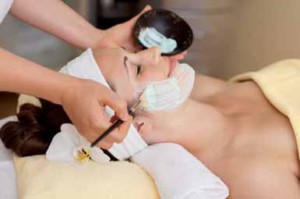 just not restricted to the metros and tier I cities. The penetration of aesthetic centres in non-metros and tier II cities and towns is robust, as well. Bhutani accentuates this when he shares, “For a number of wellness players, over 50 per cent of their new store additions, during FY13, have been beyond the top 15 cities.” Bausch & Lomb India intends to achieve a 10 per cent market share in its first year after launching equipments in the aesthetics segment shortly, as the company sees India as a potential market and the response they are getting is remarkable.
just not restricted to the metros and tier I cities. The penetration of aesthetic centres in non-metros and tier II cities and towns is robust, as well. Bhutani accentuates this when he shares, “For a number of wellness players, over 50 per cent of their new store additions, during FY13, have been beyond the top 15 cities.” Bausch & Lomb India intends to achieve a 10 per cent market share in its first year after launching equipments in the aesthetics segment shortly, as the company sees India as a potential market and the response they are getting is remarkable.
Hear it from the experts
As pointed out by Dr. Mohan Thomas, cosmetic surgeries at one time were only associated with celebrities and people of the affluent class, but today they are increasingly being undertaken by the middle class whose demand for them is based on their needs. The Founder-President on the Indian Society of Cosmetic Surgery and The Academy of Anti Ageing Medicine, Mumbai and New York further feels that at present, 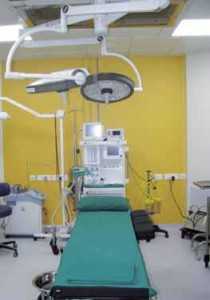 more and more men and women are opting for cosmetic procedures to look attractive in order to get lucrative jobs, best possible marriage partners and mainly get rid of any deformity that they feel impacts their self confidence and self-esteem.
more and more men and women are opting for cosmetic procedures to look attractive in order to get lucrative jobs, best possible marriage partners and mainly get rid of any deformity that they feel impacts their self confidence and self-esteem.
He adds, “Two of the other major growth drivers of the Indian cosmetic industry among others are its affordability, which comes from the growing disposable income, and the consumer awareness resulting from the active efforts of the media – especially the print media.”
Reiterating Dr. Thomas is Dr. Debraj Shome, consulting Facial Plastic Surgeon and Director, The Esthetic Clinics, Mumbai, “The milestone years for the cosmetic industry have been the past decade. When I started practice in 2003-2004, only the celebrities wanted to undergo plastic and cosmetic surgery. This has changed radically. Now, even ‘normal’ middle class folks want to undergo cosmetic surgery.Earlier, the main motivation for getting cosmetic surgery was ‘I want to act in films’. Now, it is things like ‘I want to look more pleasant’. The motivations have changed and the taboos around cosmetic surgery seem to have been eliminated.”
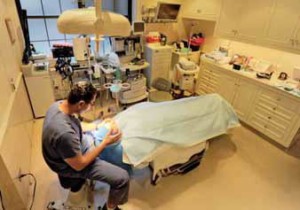
He further adds, “Cosmetic surgery also has become more predictable and less dangerous in this decade. Newer technology has now made it possible to perform non-surgical out patient procedures to achieve the same results, which needed surgery earlier. This too has fueled the consumer belief and boom in these procedures.” Like most other doctors who began with offering laser hair removal, acne scar treatment, botox fillers, and more, and then eventually offering full-fledged cosmetic treatments, Dr. Deepali Bhardwaj, too, decided to climb up the ladder and within a year she went ahead to bring in Smart Xide2 by Déka.
She claims, “I was first one to do so in North India.” Her centre named Dr. Deepali’s Skin and Hair Centre, has been a quick in introducing various treatments that also include vaginal reshaping, from Florence in Italy, which she was the first to offer in India. Dr. Chhabra at her Skin Alive clinics, offers a wide variety of treatments at our clinic. From improving facial aesthetics to body sculpting to hair and scalp rejuvenation. New age laser procedures are among the most popular at our clinics, so are treatments like diamond polishing, microdermabrasion, Botox, fillers and more.
Says Dr. Chhabra, “We provide some of the world’s best slimming and body sculpting treatments including CoolSculpting which is a revolutionary procedure to cut excess flab without going under the knife.” Dr. Vivek Kumar, Founder, Sculpt Aesthetic & Cosmetic Clinic in Delhi had launched his centre to bridge the gap between surgical and nonsurgical procedures. He says that international non surgical treatments, which have been in demand. He elaborates, “Continuing medical education and international exchange of knowledge and communication has changed the dynamics of aesthetic cultures in India.” Dr Vivek Mehta’s Pulastya Delhi Aesthetic Dermatology and Laser Centre was also launched on a similar reason as that of Sculpt.
Dr. Mehta mentions, “As we were seeing routine dermatology patients, we found a profound interest in patients for aesthetic procedures. At that time it started with simple procedures like laser hair removal and chemical peels. We handle a lot of patients suffering from acne and hormonal imbalance like Poly Cyst Ovary Disorder (PCOD) so we had a lot of women having excessive hair on face and marks left by acne, which led us to start doing peels and laser hair removal. With growing aesthetic consciousness, change in lifestyles is growing.”
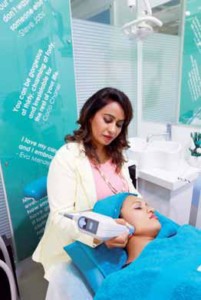
Dr. Apratim Goel, consultant dermatologist at Cutis Skin Studio in Mumbai shares that since everyone is obsessed with a fair skin, there has been a visible growth in aesthetic centres. She shares, “Everyone wants to get fairer and fairer. Though we had skin polishing and chemical peels right from the start, my clients wanted a ‘no downtime and instant result’ treatment. In the beginning of 2006, I started QS NDYAG Laser Facial for skin lightening, which is a big hit with my clients.”
Another reason that is responsible for the growth in aesthetic centres according to Dr. Thomas is related to the credibility of Indian doctors in the Western world. He
explains, “In the past five years, the number of people travelling from the West or from the Middle East, has increased tremendously. This has happened because of the expertise of the Indian doctors, who are up to date with recent advances in cosmetology and also because of the procedures being provided at a cheaper cost. This has caused a mushrooming of cosmetic centers as well as scores of Indian travel websites.”
The growing popularity and acceptance of aesthetic centres in India and of international companies taking a note of the same and launching their tools, equipments and procedures in India is well accentuated by the fact that in order to capture a pie in the rising Indian aesthetics market, estimated at $178 million by 2015, Bausch & Lomb India plans to foray into this segment with a range of its equipment targeting cosmetologists including dermatologists and plastic surgeons. As part of its foray in India, the company will make available a range of world class aesthetics products, namely- Thermage, Fraxel, Clear+Brilliant, Liposonix, Vaserlipo, Vasershape and Isolaz, in the metros of India.
Basic limitations
While in the West, looking good and also talking about the treatments undertaken is masqueraded, in India, people are not comfortable revealing the treatments they undergo. The culture here is of growing old naturally and gracefully. It is all about natural beauty and this considering India is the land for Ayurveda and Yoga, the argument is understandable.
But then, this does pose to be a major challenge for aesthetic centres as the concept of medical procedures have to be well explained to the clients. Elaborating on the challenges, Dr. Thomas shares, “Unlike mainstream medicine, there are no standards of care and the end point is subjective, as well as, dependent on expectations of the patient. A great deal of time is required to be spent with the patient which may not be feasible in a hospital setting. Effective communication, assessment of the patient needs, patient selection, psychological evaluation and compliance of the patient contribute to the final outcome, as well as, acceptance by the patients. Conflicts are bound to occur along with standoffs, which need to be managed quickly, effectively and in a sensitive manner.”
Dr. Chhabra says, “The challenges revolve around bringing to India procedures that are best suited to the Indian skin and culture. The challenge has also been about removing myths and misconceptions among people regarding aesthetic procedures. For example, many people still associate Botox with all kinds of cosmetic surgeries and injectables without knowing the distinction. Some people still believe laser skin resurfacing or laser hair removal can be dangerous to the skin. All these misconceptions will take some time to change.”
Shares Dr Rashmi Shetty, leading aesthetic physician and owner of Ra Skin & Aesthetics in Hyderabad and Mumbai, “Our main challenge revolves around clearing 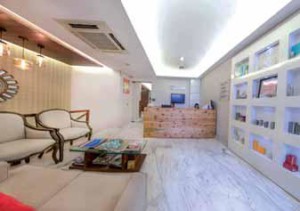 misconceptions and false notions among people. If you say cosmetic procedure, a lot of them would immediately think plastic surgery, which is not the case. Some feel you have to undergo cosmetic procedures all of one’s life. This is a challenge for us.”
misconceptions and false notions among people. If you say cosmetic procedure, a lot of them would immediately think plastic surgery, which is not the case. Some feel you have to undergo cosmetic procedures all of one’s life. This is a challenge for us.”
Dr Thomas minces no words when he highlights the legal concerns that pose as a challenge. “Globally speaking, we live in a litigious society however fortunately in this country the legal awakening has been slow. While the reprieve is temporary, one must gear up for it. Legal hassles may also include questions about the area of care and involvement of the doctor and the paramedical staff during and after the treatment is initiated. There will be several grey areas regarding areas of expertise, onus of responsibility and instructions about discharge and more. Patient compliance, which is an essential part of the post-operative care, needs to be assessed and documented and may be the weak link in the chain of care. Comprehensive patient counseling, windows for addressing of complaints or dissatisfaction and binding arbitration may be ways to prevent long and expensive litigation.”
For the patients where it is a good sign that there are more aesthetic centres opening, for the centres themselves it is proving to be a challenge to stand out from the rest. As Dr Goel shares, “With so many centres coming up every day, it is difficult to reach the clients and people really do not know who they need to trust. Marketing is obviously a very expensive tool and does not guarantee the authenticity. Anyone can claim anything in the advertisements.”
Statistics of the business growth
Dr. Shefali Trasi Nerurkar, MD Skin, Dr. Trasi’s Clinic and La Piel, Mumbai says “There has been tremendous growth in the aesthetic market in India. The craze for these procedures has increased to such an extent in India that it has put us among the top five countries. The study found that the next decade of growth in aesthetic treatments will continue to be driven by the growth of non-surgical procedures. Between 1992 and 2005, the compound annual growth rate was 7.5 per cent for surgical procedures and 27.9 for non-surgical procedures. In 2005, 34 per cent of procedures performed were surgical procedures and 66 per cent were non-surgical. In 2010, 9.5 percent of their procedures were surgical, while 90.5 per cent were nonsurgical.”
Slack systems and procedures
Dr. Kumar cites the lack of systems and procedures in place from the governing authorities as an operational challenge. He explains, “There are no guidelines or regulation bodies, so anyone can buy a laser machine and without medical opinion can
start operating the device.” In addition, the major challenges faced by this industry include small centres wanting to do everything rather than having a laddering approach to refer to experts and also, there is no audit of medical results.
According to Dr. Mehta, major challenge that aesthetic centres face are that many beauty clinics are flourishing which claim to be aesthetic centres, but the treatments are done by untrained people and devices used may be sub standard. He adds, “People need to understand that if treatment is cheap, it does not mean that it will be good. If experts are doing treatment and good quality equipments are used, then treatment will be slightly expensive.”
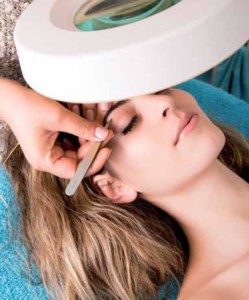
Bringing forth an important point, Dr Bhardwaj elucidates, “The market today is being spoilt due to wrong and misleading advertisements. This is one of the most important challenges being faced by the industry.” She reiterates on the issue of a lot many non-certified and non-accredited centres mushrooming across the country. She shares, “To me this is sheer quackery and is leading to a large pool of dissatisfied clients and thus reducing the quality care. Hence, trust and image in cosmetic science as a whole is being impacted.”
Equipments and tools
Space and manpower are a challenge faced by any industry and for aesthetic centres, the case is no different. Dr. Thomas shares, “To add to all of this is the difficulty in obtaining equipment, if required, from overseas. There are two things that are guaranteed in life – ageing and death and so taxes and duties follow the same. These burdens, particularly with respect to the tax levied on cosmetic surgeries, have to be passed on to the patients, which in my opinion adds to more dishonesty.” Sharing a personal challenge, he adds, “I can only vouch for myself that finance is truly a challenge from the time I engaged in my educational journey to where I am today. I’m totally enslaved by the burden of large loans by the banking institutions and not being independently wealthy.”
Dr. Kumar adds on the maintenance of equipment as another operational challenge. He shares, “High-end equipment needs a lot of maintenance with hardly any back up provided by the company.” On the equipments bit, Dr Mehta elaborates, “Major road blocks that aesthetic centres face in India are that all the good quality equipment including lasers are being imported from outside and they are quite expensive. Majority of lasers are not being manufactured in India which passes on the cost to the patient. Another drawback is lack of standardisation of aesthetic clinics in India. Quality of treatment may vary from centre to centre.”

He strongly suggests that treatments should be standardised across the aesthetic wellness industry. There should be a regulatory body to ensure that ethical practices are observed and accurate information is imparted to the customer. Adding more in the price challenge, Dr. Goel explains, “The price challenge is the biggest one. Since cheap Chinese machines are available for 1/10th of the price, some laser centres can provide cheaper treatment and spoil the aesthetic market. However, they are not only less effective, but are harmful to the patient. We get so many burn cases in our practice. Patients are not even aware what laser was used on them.”
Dr. Mehta adds, “Every six months we have to bring in new modality of treatment to achieve better results. As number of staff, equipments and patient number is increasing, we need to regularly upgrade infrastructure as well.”
Do not ignore
The aspect of confidentiality is of paramount importance for some of the clients at the
aesthetic centres. Not everyone wants to reveal their secret beauty mantra after all! Under such circumstances, it becomes a pre-requisite for any centre to safeguard their client’s privacy. Proudly revealing what makes his centre special, Dr Thomas shares, “Our facility is the state of-the-art, spread over 10,000 square feet and built in such a
way so as it is able to focus on three important things namely – safety, confidentiality and a great clinical outcome.” The confidentiality is so core for The Cosmetic Surgery Institute that separate entrances and exits are provided for post-surgery patients and those that have come for consultations.
According to Dr. Kumar, the pre-requisite for a successful centre would be, “An expert surgeon with a global exposure to technology, rest all can be managed by indigenously pleasing assistants, calm environment and good patient care.” Dr. Apratim Goel lists working holidays and good location for client access along with most updated techniques as important factors for a good and successful aesthetic centre. That is definitely an important point as working women, nothing else would suit them better.
Sharing some wise words, Dr Rizk strongly feels that, “It is important to get the proper training and expertise. Due to the loose regulations in many parts of Asia, the way to run a professional aesthetic centre is to travel to find the best training and education. Aesthetic medicine is constantly changing and it is vital to stay on top of new developments and learn how to deal with patients of all skin types. For example, darker
skin types may be harder to treat when it comes to using lasers and energy devices safely. To get good results with Botox and fillers, you should make sure to use only branded products in your centre – from global manufacturers that have the highest safety standards, such as Galderma, Allergan, Merz and others, on that level. Be wary of discounted products that may not be safe to use on your clients.”
Dealing with customer expectations
Where there are some customers who are well read and informed about what certain treatments can do and what they cannot, majority of the customers walk into an aesthetic centre expecting dramatic results. Talking about a challenge that doctors face when it comes to dealing with customer expectations, Dr. Mehta explains, “We have had
patients expecting perfection, or flawless results. Unfortunately, this might not be achievable. Whilst we may be able to greatly reduce the appearance of their acne scars or help lighten their pigmentation, in many cases, it is not possible to fully remove their imperfections. It is imperative that patients get a proper consultation and advice from their doctor to tone down unrealistic expectations. We have had to politely turn down clients who expected nothing less than perfection. We sometimes encounter patients who think their results will last them a lifetime. The truth is that maintenance sessions are often needed. The longevity of the results differs from person to person based on their lifestyle and genes.”
Dr. Chhabra says, “The requirement of the clients and their satisfaction are the foremost. Sometimes, we also have to educate people about the limits of cosmetology. We also educate people that they should be reasonable in their expectations and should not pursue cosmetic solutions as a fetish.” Says Dr Shefali Trasi, “The critical aspects to be kept in mind by medical experts while performing a treatment is to remember that every patient is different and so is their skin mechanism. Many of the patients hide the creams or tablets they have been taking for that skin problem from their doctors. So all the doctors should ask and re-ask the patients for a proper history.”
Concluding note
Dr. Chhabra opines, “With increasing incomes, increasing desire to look good, and increasing acceptability, aesthetics have a bright future in India. We will only grow from
here.” On the future, shares Dr. Trasi, “This industry perspective is very promising and will provide new technologies to make treatments safer and better controlled. Doctors now need to make an effort to supply the practice with their positive energy and share the experience and professional expertise with the patient. In addition, doctors need to keep in mind that to achieve a happy patient, it is necessary to accept the reality of patient’s problem, and understand treatment limitations in relation accordingly chose the line of treatment for him/her.”
Aptly put by Bhutani, “With the rise in awareness and the will to be presentable, the aesthetic market in India is booming with many new players coming in. Players are undertaking a number of measures to win customer trust and improve overall quality standards in the industry.”
As pointed out by Dr Thomas, according to a report by Global Industry Analysts, one of the world’s largest market research agencies, the US is the biggest market for cosmetic procedures and is expected to reach $17.57 billion in 2015. In Europe, the market is expected to hit $2.66 billion by the same year. In the coming five years, the cosmetology market in India will be more than double and the increase would primarily be in the non-surgical segment.
Dr. Rizk adds, “India is widely considered a huge growth market with great potential. The wealth and prosperity in many cities in India has grown the demand for cosmetic enhancements and will continue to grow. There are many excellent plastic surgeons and
dermatologists in India and new clinics and hospital chains are on the rise. In addition, India is gaining a reputation for a world centre for medical tourism for Europeans.”


